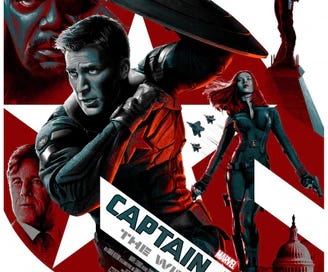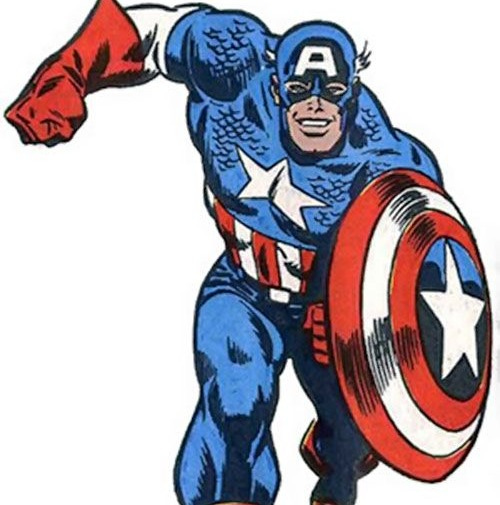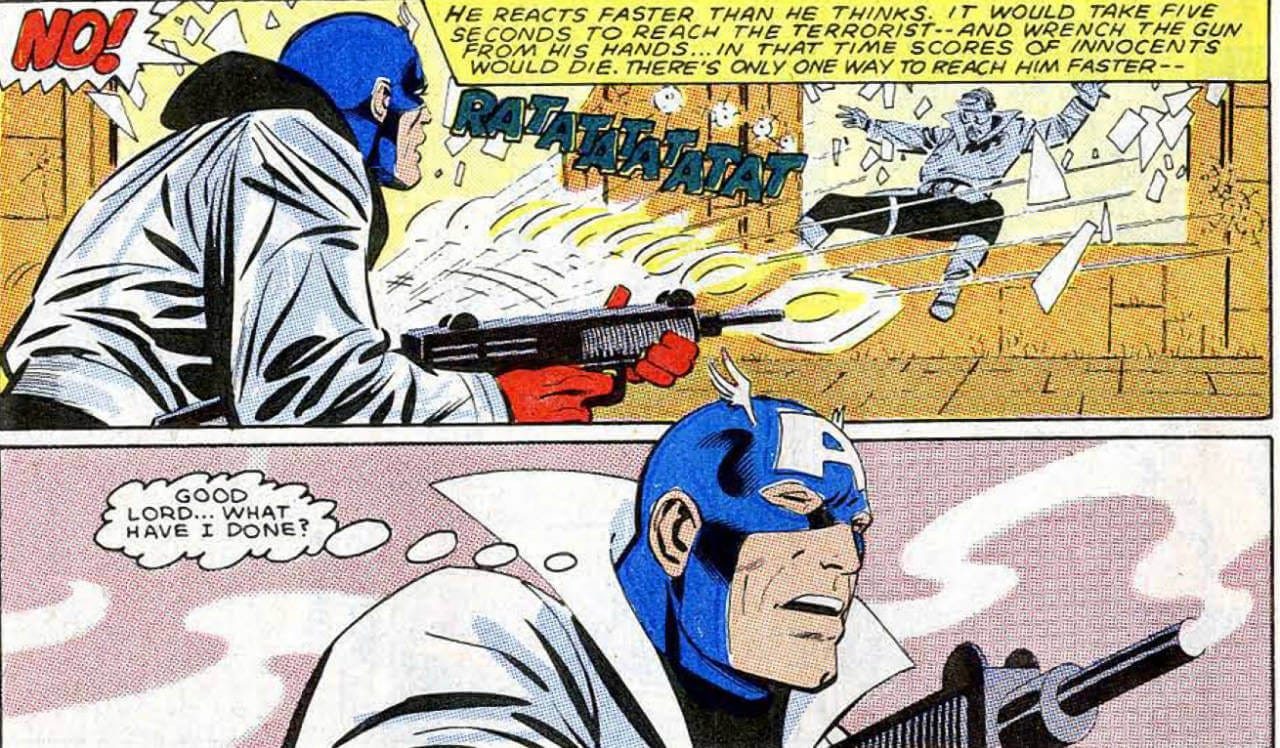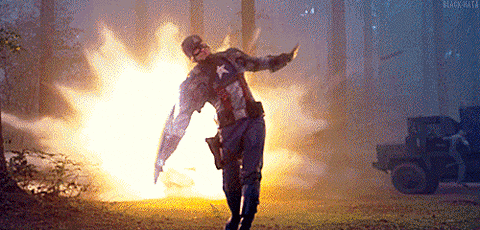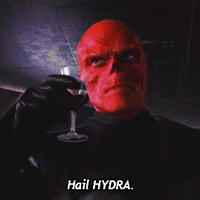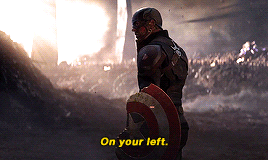With one of the most important elections in history just days away, i thought I would write a post about our country’s greatest (fictional) hero, Captain America, and how one of hids movies changed the MCU forever.
But first…
As a child in the early 80’s I don’t remember exactly when I got into super-heroes, but I have a feeling it was when The Electric Company used to show those Spider-Man shorts. That probably led me to watch Spider-Man and his Amazing Friends, which led me to read Spider-man comics, which led me to read Marvel’s Secret Wars maxi-series, which introduced me to all these other heroes and led me down the rabbit hole of comic books for the next several decades. Several expensive decades, to be honest.
In 1985, I started regularly reading Captain America. I knew who he was and vaguely remember having a Cap t-shirt when I was five or so, but I don’t remember being a huge fan until I started reading the book. Even at the tender age of nine, I found myself kind of inspired by him. Not in a ‘Merica kind of way, but something about his fighting spirit really impacted me. In a comic world full of Thors and Hulks, here was a guy who was basically slightly stronger than a regular dude, and didn’t shoot people or have a Spider-sense or anything. He just had a really cool shield. Comic Book Cap definitely varies a little from Movie Cap in this way, because Movie Cap has a plethora of Tony Stark-created gadgets, and has even been known to use machine guns, whereas Comic Cap only goes into battle with his wits and a big metal frisbee.
The gun thing always kind of struck me as odd, actually. I know he was a war veteran, but shooting people just didn’t seem like Cap. I guess it was just more cinematic, but it almost never happened in the comics in the 80’s. There was one really awesome Captain America story back in 1986 where he had a gun as part of his disguise as an agent of ULTIMATUM, a militant group lead by Flag-Smasher, a familiar name if you watched Falcon and Winter Soldier, and in a desperate attempt to stop one of the terrorists, he grabbed the gun and shot him to death. Cap felt tremendous guilt as a result, so much that even ten year-old me was moved. It became obvious to my small mind: Cap don’t kill!
It may be hard to remember this now, but there were actually a lot of questions that fans had when Marvel announced this whole Cinematic Universe deal, ranging from ”Can they pull it off?” to “Will anyone care?” I wasn’t too worried about Captain America’s cinematic portrayal, despite the 1990 version that nobody liked or cared about (because, boy, was it stupid.) The reason for that is that studios had been putting action movies out for years that featured heroes doing basically superhuman things, like lifting cars and jumping off buildings. It was viewed as completely ridiculous by most of the audience (myself included), but we still paid good money to see them, because, hey, stuff done blowed up. Now, however, there was a built-in storyline excuse for that stuff: Cap is a super-soldier. So all the completely stupid things that Willis, Seagal, Diesel, et al, had been doing for years could now be done and not be accompanied by the requisite eye roll. The stage was set for a great superhero action franchise.
Then someone at Marvel Studios (probably Kevin Feige) flipped the switch and decided, “We don’t just have to make any old, action movie.” They began by making Captain America: The First Avenger as a World War II movie, depicting Cap in his early, Nazi-fighting days, showing his origin story while still laying the groundwork for future Marvel installments. Not only did they introduce Cap, Bucky (later to become The Winter Soldier), Howard Stark and Peggy Carter (Captain Carter to some), but it also featured The Tessaract, which became the macguffin in The Avengers, and a plot point in Captain Marvel, Infinity War, Endgame and Loki. It’s actually really good story-telling that a movie can be set in the forties and still impact several movies in the franchise set in the present (or in the span of the multiverse, different futures, or alternate realities. It’s getting pretty complicated really, but still fun). Despite the amount of action and all that groundwork for future films, The First Avenger was really just a story about a kid from Brooklyn sacrificing himself to save the world from Nazi oppression. He just happened to be a super-soldier.
Then, things got really interesting. The second Captain America installment, Winter Soldier, suddenly becomes a Bourne-style spy movie. Again, there is loads of action, and this time two of the main characters are super-soldiers and the rest have cool SHIELD gadgets, so the action is turned up to 11, but at its core, this is a movie about government corruption and the lengths people in power will go to keep their secrets safe. There’s also that little drama about Cap discovering that this assassin that he has to stop is actually his childhood friend that he thought died seventy years before.
Before anyone thinks that I’m just a fanboy who is over-analyzing and this is simply another Marvel popcorn movie, let’s talk a little bit about the layers at work here. First, we see that Cap has been sent on a mission by SHIELD director Nick Fury (Samuel L. Jackson) to recover some hostages. He is accompanied by Scarlet Johansson’s Black Widow and a SHIELD strike team, although Cap does most of the heavy lifting, as Widow is a little busy with a mission of her own, which involves retrieving some errant SHIELD computer files. When Cap susses that out, he feels that him not knowing the whole score endangered the hostages. When he asks Fury what’s up with that, he is introduced to Project: Insight: three giant SHIELD heli-carriers that are equipped with enough ammunition to wipe out all the bad guys on Earth, and an algorithm that profiles them before they actually become bad guys. As a man who fought a war that he felt was all about freedom, and not killing millions of innocent Jews because some loudmouth said so, this understandably upsets Cap, who begins to mistrust the system (even more than he already did. He was pretty skeptical at one point during The Avengers, but that got put on the back-burner when the giant alien fleet was threatening to destroy the planet.) This mistrust is a great precursor to his next movie, Civil War, where Cap refuses to sign the accords that would put The Avengers under government control.
Before Cap can figure out what’s really going on, Fury is assassinated by a shadowy figure, who seems to be rather enhanced and may even have a metal arm. Of course, before he is shot and killed, Fury tells Cap that SHIELD has been compromised, and to trust no one, a cornerstone of all good spy thrillers. Secretary of State Alexander Pierce (played brilliantly by Robert Redford), a good friend of ol’ Nick, then begins looking into things, and thinks Cap may be involved somehow in Fury’s death, since he was the last one to see him alive. The strike team then turns on Cap, and he is branded a traitor, which he kind of is, technically. I mean, he’s betraying a corrupt government, but still…
Cap teams up with Black Widow, and together they try to get to the bottom of the mystery. They discover that the Project Insight algorithm can be attributed to one of Cap’s enemies from WWII, a mad Nazi scientist named Arnim Zola, who has been kept alive somehow in a really old computer (That’s never really explained fully. It was honestly a little too Tron for me, but it doesn’t really factor into the story, so I’ll allow it.) They also discover that Zola was part of Hydra, which is sort of the evil version of SHIELD, and Hydra has infiltrated all levels of the U.S. government, including SHIELD and even recruited Secretary Pierce into the fold. Hydra has also been behind some of the worst atrocities in recent history, just in case you didn’t think they were bad enough.
Cap and Widow then team-up with Sam Wilson (Anthony Mackie), who is basically Cap’s only friend (they bonded over being war vets and the fact that Cap can run really fast.) We find out that Sam has a little secret as well, because every person in every spy movie has secrets. Sam was part of an experimental military program that involved cool Stark-tech wings that allowed him to fly. I love the line when Cap finds this out and says, “I thought you were a pilot.” And Sam responds, “I never said I was a pilot." He’s just a dude with wings!
The three heroes track down and kidnap one of the ringleaders of the HYDRA conspiracy, SHIELD Agent Jasper Sitwell, who had appeared in other MCU properties and Cap had rescued earlier in the movie. Sitwell reveals that the Project: Insight heli-carriers have been re-jiggered to actually fire on good people instead of bad. Well, basically anyone Hydra sees as a threat. The concepts of “Good” and “Evil” are pretty broad in this movie. He even name drops Stephen Strange as a potential target, who at this point was probably just a surgeon, but for some reason, HYDRA didn’t like. Hey, it’s an algorithm. Sometimes Spotify recommends songs that I don't like. Algorithms.
As they are bringing him to justice, they are attacked by the Winter Soldier and more corrupt SHIELD agents. It is during this really cool fight scene where Cap discovers that Winter Soldier is, in fact, Bucky, his childhood friend, long thought dead during the War, now brain-washed and forced to do Hydra’s bidding.
I’ll never forget the reaction in the theater when I first saw this movie and the Winter Soldier removed his mask to reveal his true identity. There was an audible gasp, which I found surprising but also very cool. As a fan of the comics, I obviously knew who he was, but even if I didn’t, I feel like it should have been kind of obvious. I could understand gasping if it was Robert Redford, but really, in the context of these movies, who else could it be? Still, it speaks to the power of the characters that people were invested enough to have that reaction.
Cap and his cronies are taken prisoner, but are soon rescued by not-corrupt SHIELD agent Maria Hill, and taken to the hideout of not-dead Nick Fury. With Project: Insight ready to launch, Cap decrees that the only thing to do now is to take everyone down, including SHIELD. This leads to the climactic battle between Cap and Bucky for the fate of the world, which is admittedly pretty action movie-esque. But it’s still a really cool battle and it is pretty spectacular to watch the three heli-carriers crash into the Potomac. Plus, the damage caused by the crashing heli-carriers is used in Civil War to illustrate why super-people need to be controlled.
But we’re not done with the layers yet. During the battle, after disabling the heli-carriers, Cap refuses to fight Bucky anymore, basically Luke Skywalk-ing him back to the good side. It takes some doing, as Buck does beat the tar out of him first. As the heli-carrier they are fighting on crashes into the water, Cap is unconscious but dragged to shore by his former-ish friend, who then disappears. Widow uses her contacts to find out where he might be, and Cap and Sam take up the search, which leads to Civil War, Black Panther, Falcon and Winter Soldier, etc. It also starts a story arc for Black Widow, who was a loyal SHIELD agent for many years and now must go back underground for some spy-ery, which we later find out involved the Red Room where she was trained, and a very charismatic sister. Nick Fury is also out of a job, and presumed dead by most of the world. So he apparently hooked up with some Skrulls and just went off-planet, and we saw how that all went South in Secret Invasion. Also having to change things up as a result of all this were the TV-dwelling Agents of SHIELD, who ended up traveling the world like the A-Team, writing wrongs and stopping LMD’s.
I’ll probably end up covering Civil War in a future post, because I really love that movie too, and it is definitely a tent-pole of the MCU, but as far as the fate of Movie Cap, he fought Thanos, went to space, fought Thanos again, lifted Thor’s hammer, and ended up traveling back in time to live out his days with Peggy Carter and probably create all sorts of time variants, but really, the guy had been fighting bad guys his whole life, so he definitely earned a little happiness.
Basically, this was the 9th movie in the MCU franchise, but this, to me, was the one that started to change how the stories were told, and how each movie would go on to impact future ones. Some might say a little too much, and that each movie is just a commercial for the next one, or that it can feel like homework, having to see everything in order to understand the inter-connecting plots. Personally, I love watching cinema history being made before my eyes. Never before has one franchise connected so many stories into one, long, intricate saga, and it began here.
Winter Soldier changed everything. For the characters, for the MCU as a whole, and for movie franchises in general. For better or worse, we now have subtitles like, “a Fast and the Furious Saga,” “A Knives Out Mystery,” and more Ocean’s movies than anyone wanted. Winter Soldier started a trend, in my opinion, and it did so because it was basically so good that it couldn't be ignored. It wasn’t just a good superhero action movie, and it wasn’t just a good spy movie, and it wasn’t just a good redemption story for Bucky, but it was actually all of these things. And it involved probably the most heroic, most relatable and best Avenger of them all. Maybe he didn’t know who Nirvana was, but he sort of makes up for that in other, cooler ways. And he didn’t have to shoot anybody.
The final really cool thing to come out of this movie which laid the groundwork for future MCU movies?
So good.
Thanks for reading, as always. Since I'm writing about Captain America, I should also remind you to do the Cap thing and please vote next week. And please don’t vote for anyone who you think might secretly be a Hydra agent. And please like and subscribe and maybe even buy me a coffee/tea. You can also upgrade to paid to help keep the lights on. You know Cap would!

